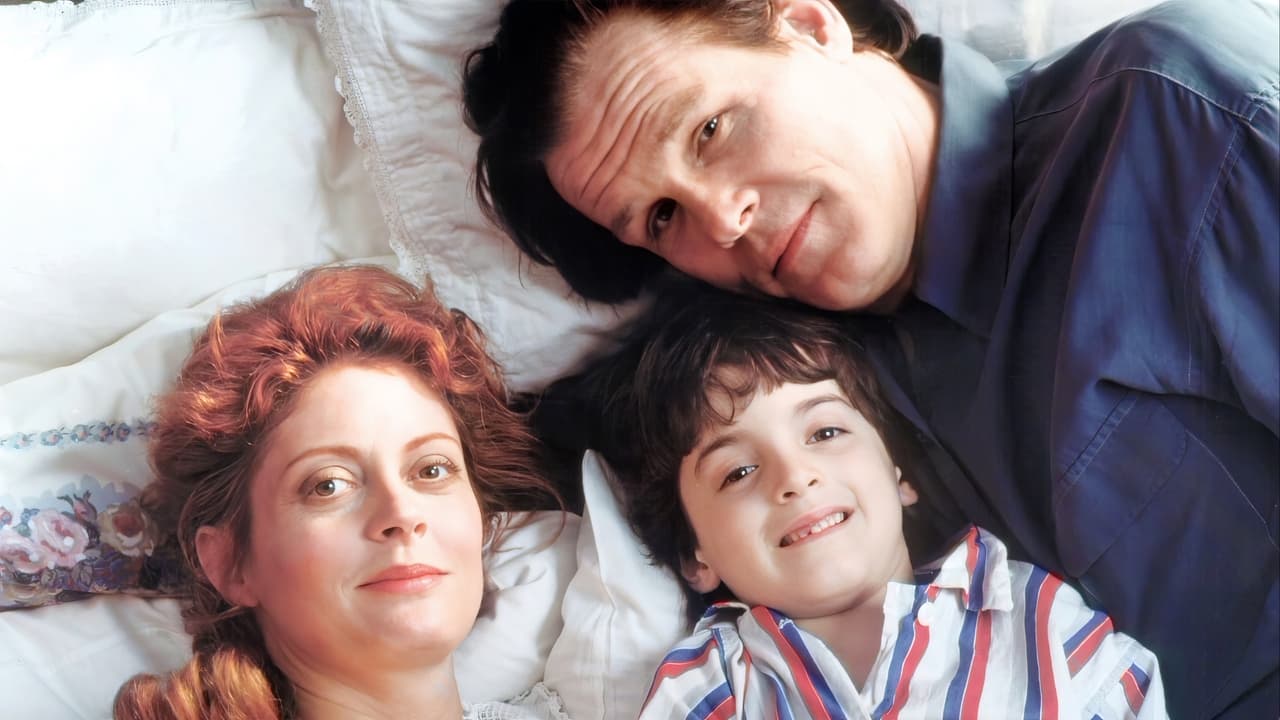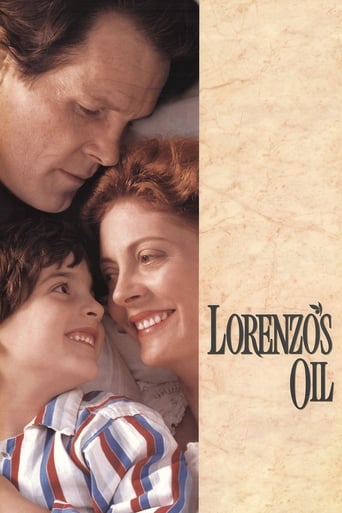

LORENZO'S OIL is an interesting film for a few reasons. First, it's based on a true story and second, the director George Miller (MAD MAX) used to be a medical doctor, so this project was probably personal for him in a way that his others weren't. Before someone gets the wrong idea, I do think this is a good film. All of the performances were realistically done, the technical details are all artfully done, and the story itself is highly inspirational. That being said, the film is a bit hard to sit through since you are relentlessly bombarded with scene after scene of a child struggling for his life against a disease that (at the time) wasn't fully understood. There was also a steep learning curve when it came to all of the medical terminology that gets tossed around, although there was some attempt to explain the more fundamental concepts related to the disease at the center of the story. And what a disease! Lorenzo Odone was diagnosed with adrenoleukodystrophy (ALD), a disease that affects how certain fatty acids are processed and leads to serious neurological problems. Keeping in mind that George Miller is a former doctor, the narrative unfolds and is presented in a very clinical fashion, with an acute focus on time. To its detriment, occasionally this bleeds over into the emotional impact of what is happening on screen. While it might be hard not to be moved by much of what is shown and discussed, there was a preparedness and calculation which undermined the more emotional moments (for me, at least). And about a third of the way into the film, after seeing scene after scene of suffering and hearing several cues of Samuel Barber's Adagio for Strings, I just became numb. All of that aside, I thought the film brought up some very important points of discussion, such as how slow the medical establishment moves and the role of compassion in medical care. There are several scenes in which parents of ALD children are pitted against the foundation and doctors simply because they feel things aren't moving fast enough. Still, as the film makes quite clear, there are proper procedures and protocols to be followed. despite the maverick efforts of the Odones to find a cure/treatment for their son's illness at all costs. Hopefully, the less scientifically inclined won't take this film as evidence that parents can just do what they want willy-nilly without regard for established science. To their credit, the Odones did their own research and worked with scientists to develop the titular oil that helped to save their boy's life. Thematically, I think the film's main message can be summed up in the opening quote which, summarized, basically says that living is struggle while the end result is up to a higher power. Maybe the film hammers this a little too hard, what with endless soundtrack cues of choral and symphonic music, but the idea that science and faith don't necessarily have to be diametrically opposed is a compelling one. There are certainly other issues/topics which are touched upon, but I feel like I've covered the most significant ones. While it isn't a perfect movie, and is shameless in its emotional manipulation, in the end it is an uplifting story that I can easily recommend. Just be aware that the journey though it isn't easy.
... View MoreTalk about being caught in an emotional wringer. This film very accurately describes the ups and downs of looking after someone you love who you know may not be long for this world. Despite all the doctors and experts telling you you should make your peace and get ready to say goodbye, you just can't. You're not ready. So you scour every avenue you can to find a miracle cure, spend every spare penny you have, put your life on hold during this fruitless search... But, nothing. And every time it LOOKS like they're making progress and, for a few blessed hours you feel a sense of rapture, the next day you're back to the drawing board. One step forward, two steps back. For the Odone's it was their son Lorenzo, for me it was a pet.Fortunately in their case, after painstaking research going on for months, and a belligerent attitude that flew in the face of medical science at the time, they were able to find an answer that kept him alive for decades longer than doctors predicted he would. Lorenzo died just one day after his 30th birthday in 2008... outliving his mother in the process. If this isn't a testimony to parental love, I don't know what is. AND they helped many other families who were struggling the same way. I think it's safe to say, without their contribution, the world would be a much more depressive place than it is.Nick Nolte and Susan Sarandon are 100% perfect as the committed father and mother who don't take 'NO' for an answer... Nolte in particular has one scene, where after reading about the devastating symptoms of deterioration his son will experience during his illness, he has a public breakdown on the steps of the library... Which is almost Oscar worthy by itself. That Italian accent he puts on could do with some work, though. There are dull patches... but these tend to work in favour of the film, as they bring home even more what it must be like, sitting next to a family member, attached to a life-support machine, waiting for the slightest sign of optimism...But, NEVER give up. 7/10
... View MoreLorenzo's Oil (I gotta finda a cure for mya boy!) (1992)In 1984, Lorenzo Odone was diagnosed with adrenoleukodystrophy (ALD,) in which enzymes that break down saturated fats are defective, and which severely affects myelin in the central nervous system. This resulted in the immediate commitment of his parents, Augusto and Michaela, to find a credible cure for the otherwise fatal disease.The story is the basic retelling of the events, with the occasionally added personal strife's of the parents, who's accuracy has been neither confirmed of denied by the real Augusto or Michaela. The plot has a quite generic outline, but boasts a more or less true story of a boy's disease that is not bombarded with other unnecessary sub-plots, which makes the effort quite admirable. However, there is the sub-plot were we see the physical and emotional decline of Michaela, but this is necessary to the story process because it provides us with good character development for Michaela and Augusto and gives us more insight on what they comprehend throughout the trial. By far the greatest thing about the film is the incredible knowledge of what it's subject matters are. The film takes with great precaution to explain to the viewer each and every procedure they try to the vocabulary that they learned, and exactly how they manage to devise the concoction of "Lorenzo's oil." However, I find aspects like the main antagonistic characters and some of the story to be crammed in the space of 110 minutes. The antagonists of the film seem to fall into the cliché of being overly arrogant and dismissive towards the underdog protagonists who try to help the cause, examples of this shows in the scenes of the APD parent meetings, where the board is unwilling to accept change unless doctoral consensus is advised. Plus there are some scenes at the end that were rushed because of time, we go from age 10 to 14 in only ten minutes, and rushes the progress of the recovery. Now the acting is also impressive, but sometimes can be unintentionally comical. To start off, Susan Surandon is impeccable as the mother, she really puts all of her effort into this role and she pulled off the vigilant motherly character with ease; you could honestly believe she that she genuinely cared for the actor playing Lorenzo. Then we find ourselves with Nick Nolte as the Italian-American father, Augusto. (sigh) Although his effort is noble, you should probably never hire a person from Omaha to play an Italian with a full-on accent. Now granted his performance is not terrible, but there were moments where I had to chuckle under my breath. In conclusion, Lorenzo's Oil is a flawed, but nevertheless enjoyable depiction of the journey to find the "impossible" cure. "Lorenzo's Oil" is a pretty good film, no masterpiece, but decent.See Full review at [email protected]
... View MoreEmotionally harrowing film of a dedicated and persistent couples struggle to find help for their son when he falls victim to a terminal illness. Their single minded quest to find if not a solution at least something to relieve their child's suffering is inspiring.Intensely real performance by Susan Sarandon and a strong one from Nick Nolte although his accent while accurate for the character makes it difficult to understand him occasionally. Beautifully true supporting performances from Peter Ustinov. Margo Martindale and others but it is hard to watch what Lorenzo has to go through. A shattering experience at times but worthwhile.
... View More